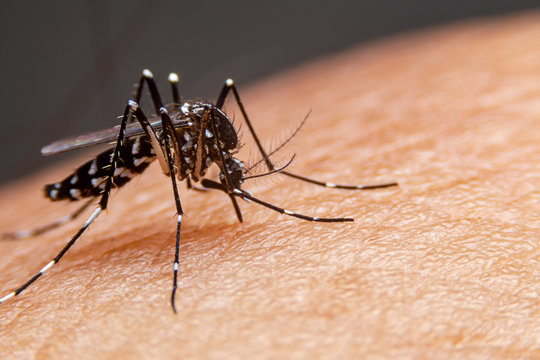- 21 people died from January 2024
- Coastal region are in higher dengue risk
- BD's climatic is favorable for dengue, malaria and chikungunya virus- WHO
Dengue issue is becoming top again in the discussion as soon as the heat comes at the end of the winter. Last year there was a stir due to the highest number of dengue cases and deaths in the country. Experts fear that the situation may be worse and worse than before.
The adverse effects of climate change are primarily being blamed for this situation from all quarters. Entomologists said the environment created due to rising temperature on one hand, and intermittent rain on the other, is conducive to breeding of mosquitoes. Such an environment becomes a breeding ground for any mosquitoes and insects. The most effective mosquito control measure in this case is to destroy the breeding grounds of mosquitoes. Otherwise, there will be no protection from mosquitoes due to the climate of Bangladesh. An expert has expressed fear that the spread of dengue will be more in coastal areas this time.
Experts said dengue is a viral infection, which is transmitted through mosquito bites. It is prevalent in tropical and subtropical climates worldwide. Most of the urban and semi-urban areas breed more of these mosquitoes. The mosquito that carries dengue virus is Aedes aegypti and to a lesser extent Aedes albopictus. In addition, temperature has a major effect on reproduction and reproduction of other mosquitoes.
Dr. Mahbubar Rahman, entomologist and former vice-chancellor of Bangabandhu Sheikh Mujib Agricultural University, said Due to the adverse effects of climate, the spread of mosquitoes in our country has reached a dangerous level. The temperature continues to raise so will the prevalence of these mosquitoes. This time it seems that dengue may spread more than last time.
The expert said the mosquito cycle is first the egg, then the larva, then the pupa, then the adult mosquito. If we cannot isolate the breeding grounds of mosquitoes, then mosquito eradication is not possible. Breeding areas should be made hostile to mosquitoes. Mosquito habitats must be destroyed. If you don't do this, no matter how much you spray it, it won't work. Heavy rain causes flooding. Then the water becomes clear. Mosquito larvae cannot be born in that clean water. But if one day it rained, the next day it didn't, during this time the water froze in places. This water is suitable for mosquito breeding.
Another entomologist and Jahangirnagar University professor Dr. Kabirul Bashar said we have pre-surveyed several other areas including Chittagong, Barguna, Chandpur, Pirojpur in the coastal region. Initially, it appears that the spread of dengue in these areas will be much higher than before. Already the signs of this are being seen through the increase in the number of patients. In this case, there is certainly an effect of temperature.
The expert said the temperature around 25 degrees Celsius (2 minus-plus) is most suitable for the breeding of Aedes mosquitoes. However, the temperature between 25 and 35 degrees is favorable for the reproduction of Aedes. In our country this temperature remains throughout the season. This time too, there is a big fear of spreading not only in the capital Dhaka, but also outside.
The Ministry of Health and Family Welfare has already held a big policy-making meeting to prevent the spread of dengue. Two mayors of Dhaka and officials of the Ministry of Health and Local Government participated. In the meeting, they discussed about the control of Aedes mosquito, the source of dengue, as well as the treatment of dengue. Local Government Minister and North City Corporation Mayor participated in a program related to mosquito control in next day in Uttara where both of them were repeatedly bitten by mosquitoes while sitting on the stage. Humor is created in different quarters.
According to the Bangladesh Chapter of the WHO, the first cases of dengue virus, known as 'Dhaka fever', were recorded in present-day Bangladesh (then East Pakistan) in the 1960s. However, since 2010, dengue outbreaks have become almost consistent every year. The Aedes mosquito as a vector of dengue spreads due to the rainy season and high temperature especially from May to September. Due to excessive rainfall, waterlogging, floods, rising temperatures and unusual changes in the country's seasonal cycle, Bangladesh's climatic conditions are becoming more favorable for transmission of dengue and other vector-borne diseases including malaria and chikungunya virus, the World Health Organization said.
Prof Dr Be-Nazir Ahmed, Former Director (Disease Control) of Department of Health, told the newspaper that there are four serotypes of dengue virus. These are DENV1, DENV2, DENV3 and DENV4. Infection with the first serotype may prolong the homologous serotype, but may not with other serotypes. Sequential infections of different serotypes put humans at risk of severe dengue. DENV1 dengue infection produces only a mild flu-like illness and is asymptomatic in more than 80 percent of cases.
He said there is no specific treatment for dengue. Case fatality rates can be kept below 1 percent with timely case detection, recognition of any warning signs of severe dengue infection, and appropriate case management. But if the entire management is not coordinated, the danger increases.
Dr. Samant Lal Sen, Minister of Health said many dengue patients have been treated in Bangladesh in the past 23 years; more patients have been infected in a single year in 2023. That is, in the last 23 years, the total number of dengue patients in the country was about two and a half lakh.
But last year 2023, almost 3 lakh were infected in just one year. This number is only for those admitted to the hospital. Apart from this, there were more patients. The minister also said this shows that we have no choice but to be careful about dengue patients. In this case, all sectors have to work together.
Dr. Rokeya Sultana, State Minister of Health, said to Dhaka City Corporation that every house should know the information about larvae. Penalties will be imposed if the rules are not followed. Those who obstruct the health care of the people of the country should be enforced with stricter rules along with fines.
According to the regular press release sent by the Department of Health on Friday, a total of 1,618 people have been hospitalized with dengue from January 1 of this year to yesterday. Out of this, 21 people have died so far.
ZH






